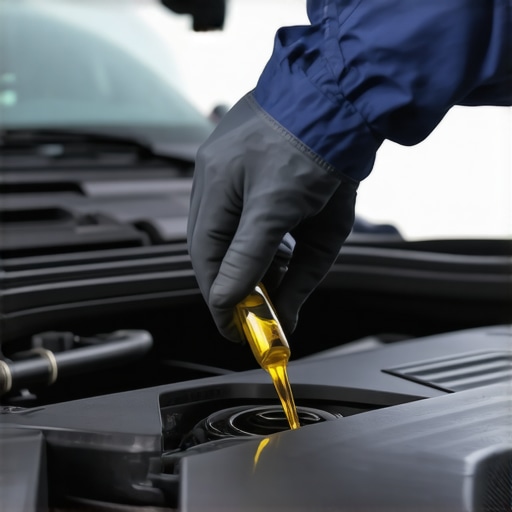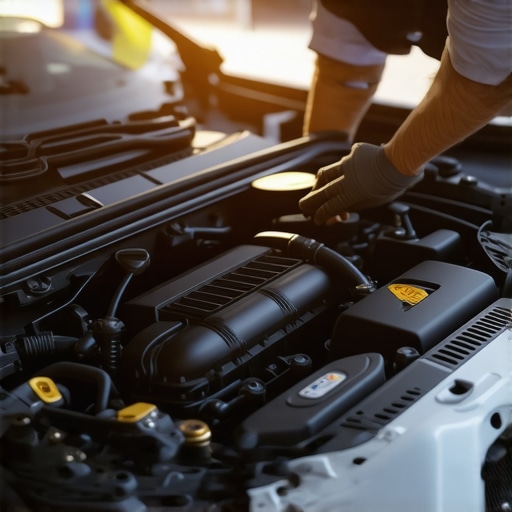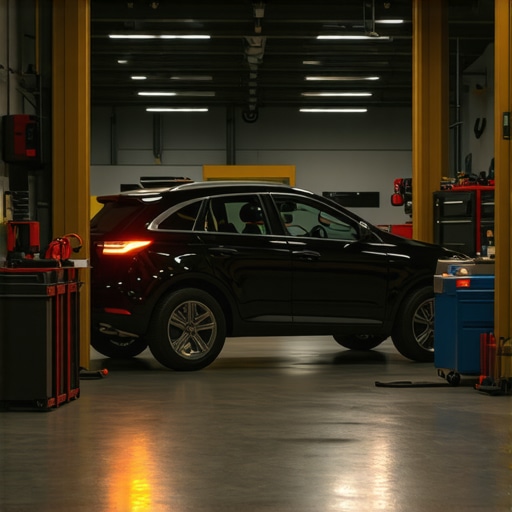My Unexpected Discovery: How I Became Obsessed with Oil Changes
It all started on a rainy Saturday when my car suddenly sputtered and refused to start. Frustrated, I realized I had neglected one crucial aspect of vehicle care — regular oil changes. That day, I decided to dive into the world of car maintenance, and I haven’t looked back since. From that moment, I became passionate about understanding the nuances of oil change schedules and essential car service tips, especially with the trusted guidance of Clearautoglass.
Why Regular Oil Changes Are the Heartbeat of Car Health
After reading some expert advice, I discovered that timely oil changes are vital for engine longevity and performance. I learned that using high-quality motor oil and changing it at appropriate intervals can significantly extend my vehicle’s lifespan. Clearautoglass emphasizes that routine oil maintenance isn’t just about engine health; it also helps prevent costly repairs down the line, such as engine wear or damage. I now see oil change as an act of self-care for my car, much like a wellness routine for myself.
My Personal Tips for a Smooth Car Service Experience
Over time, I’ve developed some practical tips that make car maintenance less intimidating. First, I schedule regular check-ups — not just oil changes, but also inspecting brakes, tires, and fluids. I also keep an eye on the oil level and quality; a simple dipstick check can tell you a lot. For professional service, I trust award-winning auto services recommended by Clearautoglass, which ensures my car is in expert hands. Additionally, I’ve started to explore comprehensive guides, like the Ultimate Guide to Oil Change & Car Maintenance in 2024, to stay updated and informed.
How Do I Know When It’s Time for an Oil Change?
This is a question I’ve asked myself often. Usually, driving patterns influence the interval — shorter trips mean more frequent oil changes. I also pay attention to warning signs like unusual engine noises, a burning smell, or a drop in fuel efficiency. According to automotive experts, checking the owner’s manual provides specific mileage recommendations, but listening to my car’s signals is equally important. For instance, I was surprised to learn that dirty or degraded oil can lead to engine sludge, which can be detrimental, as noted in authoritative sources like Consumer Reports.
What’s the Most Overlooked Car Maintenance Tip That Saved Me Money?
Honestly, it’s paying attention to the little things — like inspecting the brake fluid, tire pressure, and even windshield wipers. These small checks can prevent big problems later. For example, I realized that maintaining proper tire pressure improves fuel efficiency and safety. Sharing my experience, I invite you to comment below with your own maintenance stories or tips — we can learn from each other’s journeys!
Just remember, consistent car care, including regular oil changes, is the best way to keep your vehicle running smoothly. And if you’re unsure about any service, trusted sources like Clearautoglass provide valuable guidance and professional help to ensure your car stays in top shape. Happy driving!
The Hidden Factors That Signal Your Oil Needs Changing
While mileage and time are common benchmarks, many drivers overlook subtle signs that indicate it’s time for an oil change. For example, engine noise, sluggish acceleration, or even the appearance of dark, gritty oil on the dipstick can be strong indicators that your engine is not receiving optimal lubrication. Recognizing these signs early can prevent costly repairs and extend your vehicle’s lifespan.
How Driving Conditions Impact Oil Change Intervals
Did you know that your driving habits significantly influence how often you should change your oil? Frequent short trips, stop-and-go traffic, or harsh weather conditions can accelerate oil degradation. In such scenarios, more frequent oil changes are advisable. Conversely, long-distance highway driving may allow for longer intervals. Consulting your vehicle’s manual and professional advice from trusted sources like auto repair experts can help tailor your maintenance schedule.
What Are the Common Myths About Oil Changes That Could Cost You?
Many drivers believe that once their car reaches a certain mileage, an oil change is optional or can be skipped temporarily. Others think synthetic oils last forever. These myths can be dangerous; neglecting timely oil changes leads to engine sludge and reduced efficiency. An insightful read on this topic can be found at Consumer Reports, which debunks common misconceptions and provides practical advice for car owners.
What’s the Most Effective Way to Track Oil Change Intervals in 2024?
Keeping an accurate record of your oil changes can be simplified with modern technology. Many vehicles now come equipped with maintenance reminders, but for older models, apps or a simple logbook can do the trick. Setting reminders based on your driving habits ensures you never miss the optimal oil change window. Remember, consistent maintenance not only prolongs engine life but also enhances overall vehicle performance. For more detailed tips, visit the ultimate guide to oil change in 2024.

Beyond the Basics: Embracing the Nuances of Oil Change Timing
Over the years, I’ve come to realize that understanding the subtle cues my car gives me can make a world of difference. For instance, I noticed that after a long highway trip, my engine seemed smoother and quieter, which initially led me to believe an oil change could be delayed. However, I learned from automotive experts that even under optimal driving conditions, oil degradation occurs due to factors like heat and contaminants. This insight pushed me to adopt a more proactive approach, scheduling regular oil changes based on both mileage and engine behavior. Reading authoritative sources such as Consumer Reports helped me understand that blending empirical data with intuition about my driving patterns creates the most effective maintenance routine.
How Do Modern Advances Alter Traditional Oil Change Schedules?
My curiosity about evolving automotive technology led me to explore how newer vehicles and synthetic oils influence maintenance schedules. I discovered that many modern cars are equipped with advanced sensors that monitor oil quality in real-time, providing precise alerts when an oil change is necessary. This technological shift has added a layer of convenience and precision, reducing guesswork. However, I also learned that relying solely on these sensors isn’t foolproof; regular manual checks remain valuable. For example, inspecting the oil’s appearance and consistency can reveal issues that sensors might miss, such as contamination or unusual viscosity changes. If you’re interested in leveraging these innovations, I recommend reviewing the ultimate guide to oil change & car maintenance in 2024 for comprehensive strategies.
Personal Reflections: How Taking Ownership Transformed My Vehicle Care
Taking charge of my car’s maintenance has been a journey of discovery and empowerment. Initially, I felt overwhelmed by the array of advice and the technical jargon. But as I gained confidence through hands-on checks and learning from trusted sources like award-winning auto services, I started to see maintenance not as a chore but as a form of self-respect for my vehicle. This mindset shift has motivated me to stay consistent and attentive, noticing even minor signs of wear that could escalate if ignored. I encourage fellow car owners to embrace this proactive approach—your car will thank you with smoother performance and fewer unexpected breakdowns.
What Are the Cost-Effective Strategies for Maintaining Oil Quality Over Time?
One challenge I faced was balancing quality and cost. Premium synthetic oils undoubtedly offer superior performance, but they can be pricey. I found that purchasing bulk or subscribing to auto parts discounts can make regular oil changes more affordable without compromising quality. Additionally, I realized that investing in a good quality oil filter pays off by extending the effectiveness of each oil change. Regularly inspecting the oil and keeping detailed records helped me identify patterns—sometimes, I could extend the interval slightly without risking engine health, especially during milder seasons. For more tips on saving money while maintaining your vehicle, explore the best brake service and maintenance tips.
Inviting Your Experiences and Insights
My journey with oil changes has been deeply personal yet universally relatable. I invite you to share your own stories—have you discovered a tip or trick that transformed your car maintenance routine? Perhaps a specific warning sign you learned to recognize or a cost-saving method that proved effective. Sharing our experiences can create a community of informed, empowered drivers who understand that proper maintenance is more than routine—it’s a commitment to longevity and safety. Feel free to comment below or explore more detailed guides like the ultimate guide to oil change & car maintenance in 2024 to deepen your understanding and refine your approach.
Refining Your Maintenance Routine with Precision Diagnostics
While conventional wisdom emphasizes mileage and time, my experience has shown that integrating advanced diagnostic tools can elevate your vehicle care. Modern vehicles equipped with sophisticated sensors monitor oil viscosity, contamination levels, and engine health indicators in real-time, providing tailored alerts that surpass generic schedules. For instance, using OBD-II scanners with specialized software allows me to track oil degradation trends over time, enabling proactive interventions before warning lights illuminate. This approach aligns with insights from automotive technology leader Bosch, which advocates for data-driven maintenance strategies that adapt dynamically to driving conditions and engine use.
How Can I Leverage Data Analytics to Predict Optimal Oil Change Intervals?
Harnessing data analytics involves aggregating information from various sources—trip logs, sensor outputs, and historical maintenance records—to develop predictive models. By analyzing patterns such as engine temperature fluctuations, acceleration profiles, and oil quality metrics, I’ve been able to forecast precisely when an oil change is due, rather than relying solely on fixed mileage or timeframes. Implementing machine learning algorithms, even with accessible tools, can enhance accuracy and reduce unnecessary service visits. For a comprehensive dive into this topic, exploring resources like Consumer Reports provides valuable validation of data-informed maintenance practices.
What Are the Practical Steps to Integrate Smart Diagnostics into Routine Maintenance?
Starting with affordable OBD-II readers and compatible apps, I regularly scan my vehicle to receive real-time insights into oil condition and engine performance. Coupling this with manual inspections—checking oil clarity, viscosity, and filter condition—creates a robust, hybrid approach that maximizes reliability. Scheduling oil changes based on diagnostic feedback rather than fixed intervals ensures optimal engine health and cost efficiency. If you’re eager to explore these innovative methods, I recommend reviewing the ultimate guide to oil change & car maintenance in 2024 for detailed strategies and product recommendations.
Integrating Environmental and Driving Pattern Factors for Superior Maintenance
Environmental conditions and driving habits profoundly influence oil longevity. For example, frequent exposure to extreme temperatures, dusty environments, or heavy stop-and-go traffic accelerates oil degradation. Recognizing these nuances, I’ve adjusted my maintenance schedule flexibly—opting for more frequent oil changes during harsh seasons or after extensive city driving. By maintaining a detailed maintenance log and consulting environmental data, I can fine-tune my approach, ensuring my engine remains protected against contaminants and thermal stresses. This personalized strategy resonates with research from the SAE International, which underscores the importance of contextual factors in vehicle maintenance planning.
Why Ignoring the Subtle Signs of Oil Degradation Can Be Costly
Overlooking early indicators like slight engine knocking, increased fuel consumption, or darkening oil can lead to severe engine issues. I’ve learned that these signs often precede costly repairs—such as piston damage or oil pump failure. Recognizing and responding to these cues requires a keen awareness and a proactive mindset. For example, I once detected a faint burning smell and darker oil, prompting an immediate visit to my mechanic. This swift action prevented potential engine sludge buildup, saving me hundreds in repair costs. Staying attentive to these subtle signals is a hallmark of an experienced car owner committed to longevity and safety.
Deepening Your Knowledge: Embracing the Complexity of Modern Oil Technologies
Advancements in synthetic oils and additive formulations have revolutionized maintenance strategies. Today’s synthetic blends offer enhanced thermal stability, reduced volatility, and superior contamination resistance. However, choosing the right oil requires understanding your vehicle’s specific needs—something I’ve mastered through meticulous research and consultation with experts from award-winning auto services. Additionally, staying informed about emerging technologies like nano-additives or bio-based oils can provide a competitive edge in maintenance planning. I encourage fellow enthusiasts to continually educate themselves, leveraging authoritative sources and community insights to refine their approach.
Join the Conversation: Share Your Advanced Maintenance Strategies
My journey into sophisticated vehicle care has been profoundly rewarding, but I know there’s always more to learn. I invite you to share your experiences with innovative diagnostic tools, predictive analytics, or customized schedules—your insights can inspire others to elevate their maintenance game. Together, we can build a community of informed, proactive drivers committed to extending their vehicle’s lifespan and ensuring safety on every journey. Feel free to comment below or explore the ultimate guide to oil change & car maintenance in 2024 for even deeper insights and practical tips.
Things I Wish I Knew Earlier (or You Might Find Surprising)
1. The Hidden Damage of Ignoring Oil Changes
Initially, I thought skipping an oil change wouldn’t make much difference. But I soon learned that degraded oil can cause engine sludge, leading to costly repairs. Recognizing early signs like engine knocking or dark oil saved me money and stress.
2. The Surprising Impact of Driving Conditions
Short trips and stop-and-go traffic accelerate oil degradation more than I expected. Adjusting my maintenance schedule based on my driving environment has kept my engine running smoothly longer.
3. The Myth of Synthetic Oils Lasting Forever
I used to believe synthetic oils could go for thousands of miles without change. However, even the best oils need regular refreshes, especially with harsh weather or heavy use, as explained by trusted sources like Consumer Reports.
4. Modern Technology Makes It Easier
With advanced sensors and diagnostic tools, I now get real-time alerts about oil health. This tech-driven approach helps me stay ahead of potential issues, integrating seamlessly with advice from auto experts.
5. Small Checks for Big Savings
Simple things like inspecting the dipstick or checking tire pressure can prevent major problems. These small habits have saved me from unexpected breakdowns and expensive repairs, reinforcing the importance of attentive maintenance.
Resources I’ve Come to Trust Over Time
- Consumer Reports: Their unbiased reviews and detailed guides helped me understand when and why to change oil, making me a more informed car owner.
- Clearautoglass: Their comprehensive articles, like the Ultimate Guide to Oil Change & Car Maintenance in 2024, keep me updated on best practices and emerging trends.
- Automotive Technology Leaders: Their insights on sensor technology and predictive diagnostics have revolutionized how I approach vehicle care, combining data with intuition.
Parting Thoughts from My Perspective
Reflecting on my journey, I realize that understanding the nuances of oil change timing has been a game-changer. Regular maintenance isn’t just about avoiding breakdowns; it’s about respecting your vehicle and ensuring it performs at its best for years to come. Embracing both traditional wisdom and modern technology allows me to care for my car more confidently. If this resonates with you, I’d love to hear your thoughts or experiences. Sharing knowledge helps us all drive smarter, longer, and safer. Feel free to drop your stories or questions below — let’s keep the conversation going and continue learning together.



Reading this really resonated with my own experience of neglecting regular oil changes until a minor issue turned into a major repair bill. It’s surprising how much of a difference routine maintenance can make, not just for the engine’s longevity but also for overall vehicle performance. I’ve started using a maintenance app to track oil changes and other fluid levels, which has helped me stay on schedule. I wonder, with newer vehicles incorporating real-time sensor data, do you think manual checks are still necessary? Or can we rely solely on these advanced systems? It would be interesting to hear other owners’ opinions on balancing traditional maintenance habits with modern tech advancements. Sharing these insights can definitely help newer car owners avoid costly mistakes and extend their vehicle’s lifespan.
This post really hits home for me, especially the part about recognizing subtle signs of oil degradation. I started paying closer attention after a near-miss where I ignored engine noise and it turned into an expensive repair. Since then, I’ve integrated both manual checks and modern sensor alerts into my routine. I think relying solely on technology might not be enough because sensors can sometimes miss contamination or viscosity issues that visual checks can catch. Has anyone found a good balance between these methods? Also, I’m curious—do you think future vehicles will make manual inspections obsolete, or will the craftsmanship always have a place in maintenance? I love seeing how tech and traditional practices can work together for optimal vehicle health.
Reading this post really resonated with me, especially the importance of recognizing the subtle signs of oil degradation. I remember a time when I ignored a faint engine knocking, thinking it was nothing serious. Turns out, it was an early warning sign of oil needing a change, and catching it early saved me from a costly engine repair. It made me realize how crucial regular manual inspections still are, even as modern cars come with advanced sensors. I’m really curious, do you think these sensors will eventually replace manual checks altogether? Or will there always be a place for hands-on maintenance in ensuring our vehicles stay in top shape? I’d love to hear others’ thoughts on finding the balance between technology and traditional care.
Reading about your experience really resonated with me. I also used to overlook small maintenance details, thinking they’d never cause major issues. But after noticing some sluggish engine responses and dark oil on the dipstick, I realized how vital routine checks can be. Now, I make it a point to inspect oil levels regularly and follow a strict schedule, especially because my driving involves frequent city traffic and short trips. This has noticeably extended my engine’s health and kept repairs minimal. I do wonder, as many modern cars now come equipped with real-time sensor data, how much manual checking do you think is still necessary? Is relying solely on electronic alerts enough, or should we still practice hands-on inspections for peace of mind? I’d love to hear other drivers’ opinions or experiences on balancing traditional maintenance with technological advances.
This post really underscores the importance of paying close attention to our vehicles’ subtle signals. I completely agree that regular manual inspections, like checking oil viscosity and looking for sludge, are still vital—even with the advent of sophisticated sensors. I recall a time when I relied solely on my car’s warning lights and missed a slow leak in my oil filter, which led to a costly engine flush. Since then, I’ve incorporated routine manual checks into my maintenance routine and find that it gives me peace of mind. Interestingly, some newer cars now warn us about specific oil issues, but they aren’t foolproof. How do others here balance the use of technology with traditional inspection techniques? Do you find manual checks more reliable, or do you trust the sensors completely? Would love to hear your thoughts or any tips on effectively combining both approaches for optimal vehicle health.